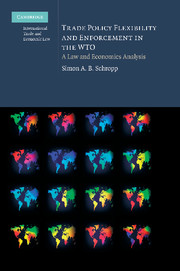Book contents
- Frontmatter
- Contents
- List of figures
- List of abbreviations
- Acknowledgements
- Foreword
- 1 Introduction: trade policy flexibility in the WTO – vice or virtue?
- PART I An introduction to incomplete contracting
- PART II Theorizing about the WTO as an incomplete contract
- PART III Flexibility and enforcement in the WTO: towards an agenda for reform
- Bibliography
- Index
Foreword
Published online by Cambridge University Press: 05 May 2010
- Frontmatter
- Contents
- List of figures
- List of abbreviations
- Acknowledgements
- Foreword
- 1 Introduction: trade policy flexibility in the WTO – vice or virtue?
- PART I An introduction to incomplete contracting
- PART II Theorizing about the WTO as an incomplete contract
- PART III Flexibility and enforcement in the WTO: towards an agenda for reform
- Bibliography
- Index
Summary
The study of WTO dispute settlement has been attracting increasing interest in law and economics scholarship: in part, as a reaction to the largely impressionistic early legal literature, which had decided on the effectiveness of the new regime on scarce evidence; in part, because of the characteristics of the new regime – compulsory third party adjudication is not the paradigmatic adjudication process in international relations. There is already an impressive body of literature that addresses a series of questions relating to the participation of various WTO Members in proceedings; the impact of third parties on the outcome; the legal capacity of the various participants as an explanatory variable for success in proceedings; the propensity of complainants to prevail; the decision to litigate, and the connected decision to move from one stage of the proceedings to the next. The predictive power of the various models employed varies, and some would argue that it is probably too early to have robust empirical evidence for many of them.
The study of remedies occupies a prominent place within this body of literature. The original contributions, which saw nothing wrong with the WTO system, gave way to more skeptical views over time. There are few empirical papers and lack of transparency often makes this study difficult. Simon Schropp is on top of the literature, and this volume displays it in excellent manner. However, this is not all that the author does.
- Type
- Chapter
- Information
- Trade Policy Flexibility and Enforcement in the WTOA Law and Economics Analysis, pp. xvii - xviiiPublisher: Cambridge University PressPrint publication year: 2009

